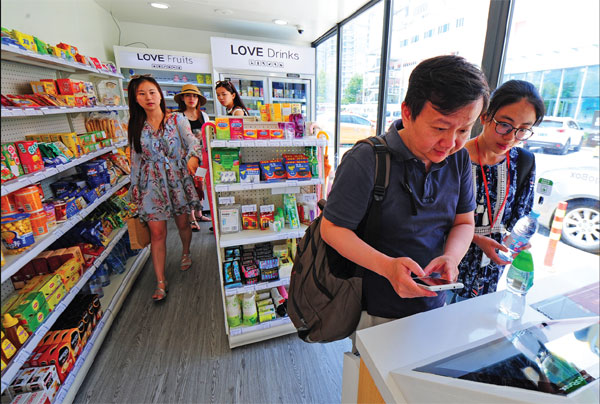IN BRIEF (Page 24)

| A convenience store in Shanghai uses an automatic check-out machine on June 17. This is the first store in the city to apply the technology. Ji Haixin / China Daily |
Report: E-payments aid rebalancing of economy
The rapid rise of third-party electronic payments is boosting the growth of China's online consumer market and will support the economy's rebalancing, according to a recent research report from Moody's. The value of third-party e-payments in China has grown at an annual rate of more than 100 percent since 2015, offering consumers an alternative to banks' payment channels at lower transaction costs, said the global rating agency. The growth stimulates online consumption and services, benefiting internet companies and service companies along the supply chain, it said. In the longer term, the development of e-payments and overall growth of e-commerce will encourage China's economic rebalancing toward consumption from investment, according to Moody's. It will support growth of the service sector, which will boost employment and consumption, and in turn stimulate more e-payments, said the report.
Ford reshuffling its business layout
US auto giant Ford announced on June 20 it plans to move its Focus production to China in 2019. The automaker also announced on its website that it would invest $900 million in a Kentucky truck plant to produce the all-new Ford Expedition and Lincoln Navigator. "Finding a more cost-effective way to deliver the next Focus program in North America is a better plan, allowing us to redeploy the money we save into areas of growth for the company - especially sport utilities, commercial vehicles, performance vehicles as well as mobility, autonomous vehicles and electrified vehicles," says Joe Hinrichs, Ford executive vice-president and president of Global Operations. Ford says the North American Focus production at the Michigan Assembly Plant will remain until mid-2018. Afterward, the Michigan Assembly plant will be converted to produce the new Ranger pickup, starting in late 2018, and the new Bronco SUV in 2020.
Move made to ease liquidity pressure
China's central bank injected 120 billion yuan ($17.65 billion; 15.79 billion euros; £13.93 billion) on June 19 into the financial system through open market operations, to ease liquidity pressure. The operations included 50 billion yuan of seven-day reverse repos, 40 billion yuan of 14-day reverse repos and 30 billion yuan of 28-day contracts. These were at respective interest rates of 2.45, 2.6, and 2.75 percent, the People's Bank of China said on its website. The PBOC said the new operations followed a decline in overall liquidity, due to factors including payments for government bonds. Offset by 10 billion yuan of maturing reverse repos, the PBOC injected net liquidity of 110 billion yuan into the market through reverse repos on June 19. China has set the tone of its monetary policy in 2017 as prudent and neutral, keeping an appropriate liquidity level, but avoiding excessive liquidity injections.
Bankers optimistic about economy
Chinese bankers are more optimistic about the country's macroeconomic conditions, according to results of the latest survey by the People's Bank of China, the central bank, released on June 20. The bankers macroeconomic confidence index, compiled by the central bank, was 67.8 percent for the second quarter of this year, 2.9 percentage points higher than the first quarter, according to survey results.
Norway has signed salmon agreement
Norway has agreed in principle to resume exports of farmed salmon to China after seven years, Norway's fisheries minister said on June 20. "For some weeks now there have been discussions between the food safety authorities in China and Norway on how we can ensure predictability for salmon exports from Norway to China," Per Sandberg said in the published text of a speech. "I am pleased to announce that we today have signed a formal agreement, which outlines the framework for salmon exports from Norway to China," he added.
China's ODI down by 38.8 percent in May
China's nonfinancial outbound direct investment dropped by 38.8 percent year-on-year to $8.22 billion in May, official data showed. In the first five months of this year, the country's nonfinancial ODI dropped by 53 percent year-on-year to $34.59 billion, according to the Ministry of Commerce. Chinese companies invested in 3,121 overseas enterprises in 145 countries and regions from January to May, data showed. Commercial services, manufacturing and information transmission, and the software and information technology industries took the lead in investment value. Outbound investment in economies involved in the Belt and Road Initiative accounted for 14.4 percent of total ODI in the first five months, up by 6.7 percentage points from the same period in 2016.
CSRC chief: Key role for securities industry
Rapid development of the capital market is creating opportunities for China to establish world-class investment banks, according to the country's top securities regulator. Official data show that the country's securities industry had been steadily progressing with capital and total assets more than doubling in the past five years. "The figures indicate the industry has played a more important role in raising capital, optimizing resource allocation and serving the real economy and investors," Liu Shiyu, head of the China Securities Regulatory Commission, said at a securities conference last weekend.
Ethiopia inaugurates 1st phase of industrial park
Ethiopia inaugurated on June 20 the first phase of its flagship Chinese built Hawassa Industrial Park dedicated to textile and apparel making. Built by China Civil Engineering Corp, the industrial park, located in Ethiopia's southern city of Hawassa, was completed in July 2016 in a record time of nine months. Speaking at the inaugural ceremony on June 19, Ethiopian Prime Minister Hailemariam Desalegn said that the Hawassa industrial park can be seen as a "foundation in Ethiopia's ambition to be the manufacturing hub of the African continent". Eighteen companies have already started operations inside the industrial park, and six of them will export their products to the global market. Once operational at its full potential, the park is expected to generate $1 billion for the East African country annually. The Ethiopian government has planned to construct 10 industrial parks across the country, aiming at creating more jobs, earning revenue and promoting technology transfer. The majority of the parks are being constructed by Chinese firms.
New Tanzania factory has Chinese investment
Tanzanian President John Magufuli launched the Chinese-invested steel factory Kiluwa Steel Group, located in the eastern district of Kibaha, on June 21. Speaking at its official launch, Magufuli commended the Chinese investors for choosing Tanzania as their investment destination in East Africa, calling on other foreign investors to follow suit. He described the new Chinese investment as important, since it is part and parcel of the government-driven industrialization agenda. "This is an important project for Tanzania as it produces quality iron bars that meet the international standard, as they are used in any bridge across the globe," Magufuli said. He discouraged the tendency of importing raw materials from other countries, since there is a big deposit of iron ore in Mchuchuma in the southern part of the country. The Kiluwa Steel Group, located in Mlandizi area of Kibaha district in the coastal region, has the capacity to produce 300,000 ton of iron bars per year in the first phase. In the second phase, the plant will produce an average of 1.2 million tons of iron bars per year.
(China Daily Africa Weekly 06/23/2017 page24)
Today's Top News
- Crossing a milestone in the journey called Sinology
- China-Russia media forum held in Beijing
- Where mobility will drive China and the West
- HK community strongly supports Lai's conviction
- Japan paying high price for PM's rhetoric
- Japan's move to mislead public firmly opposed































